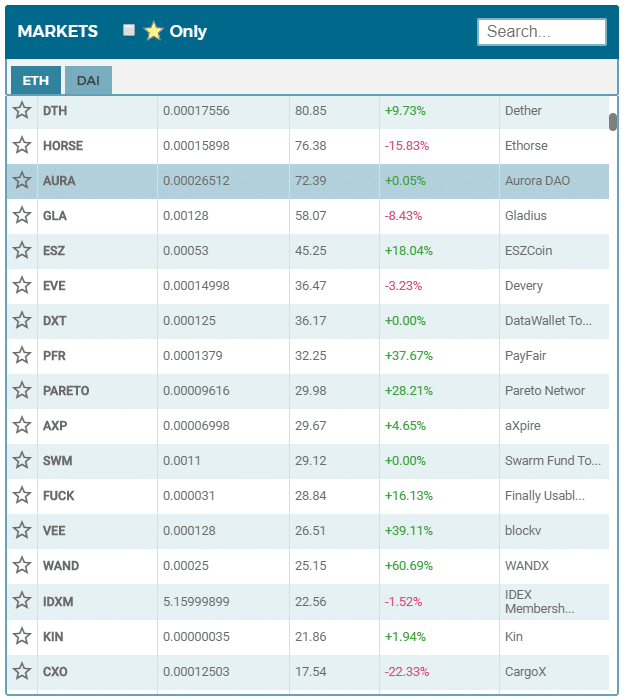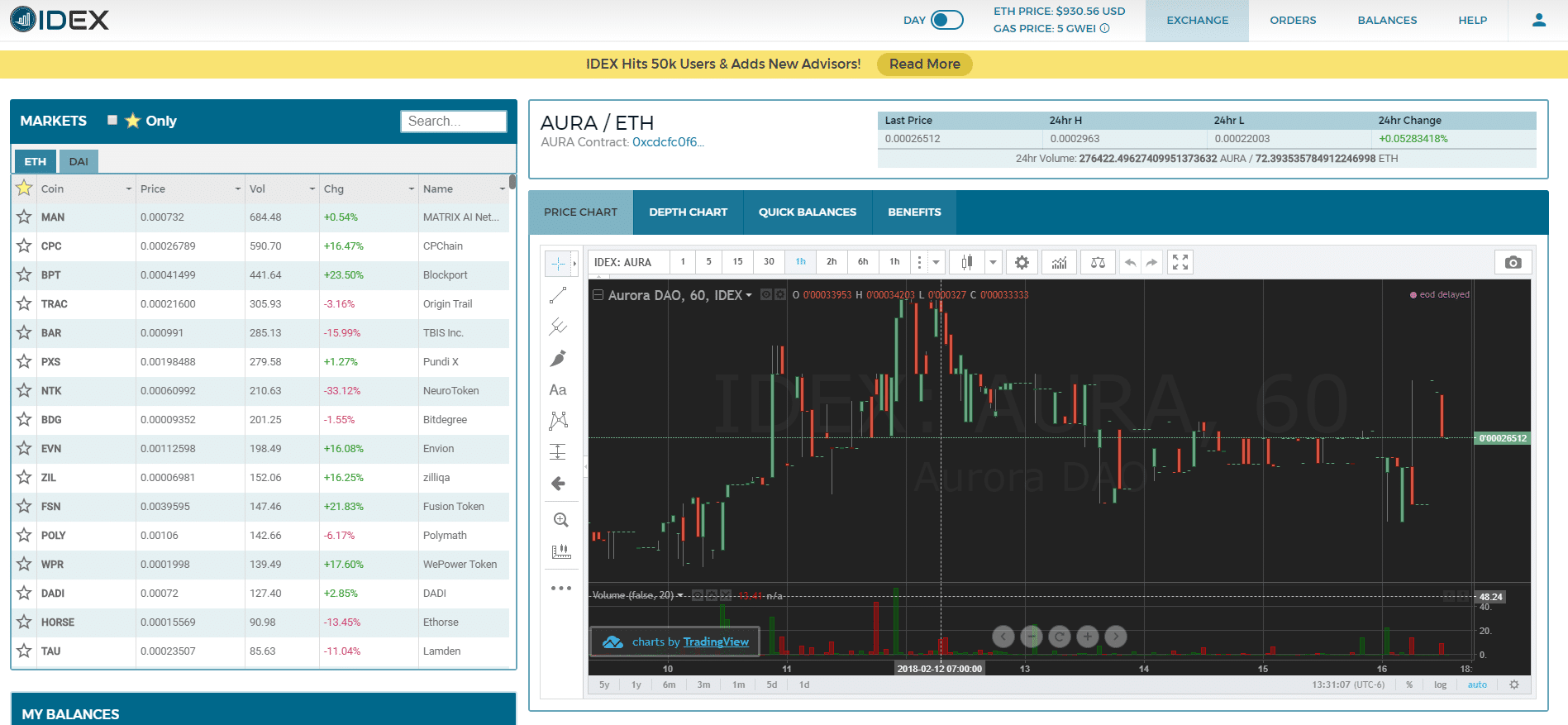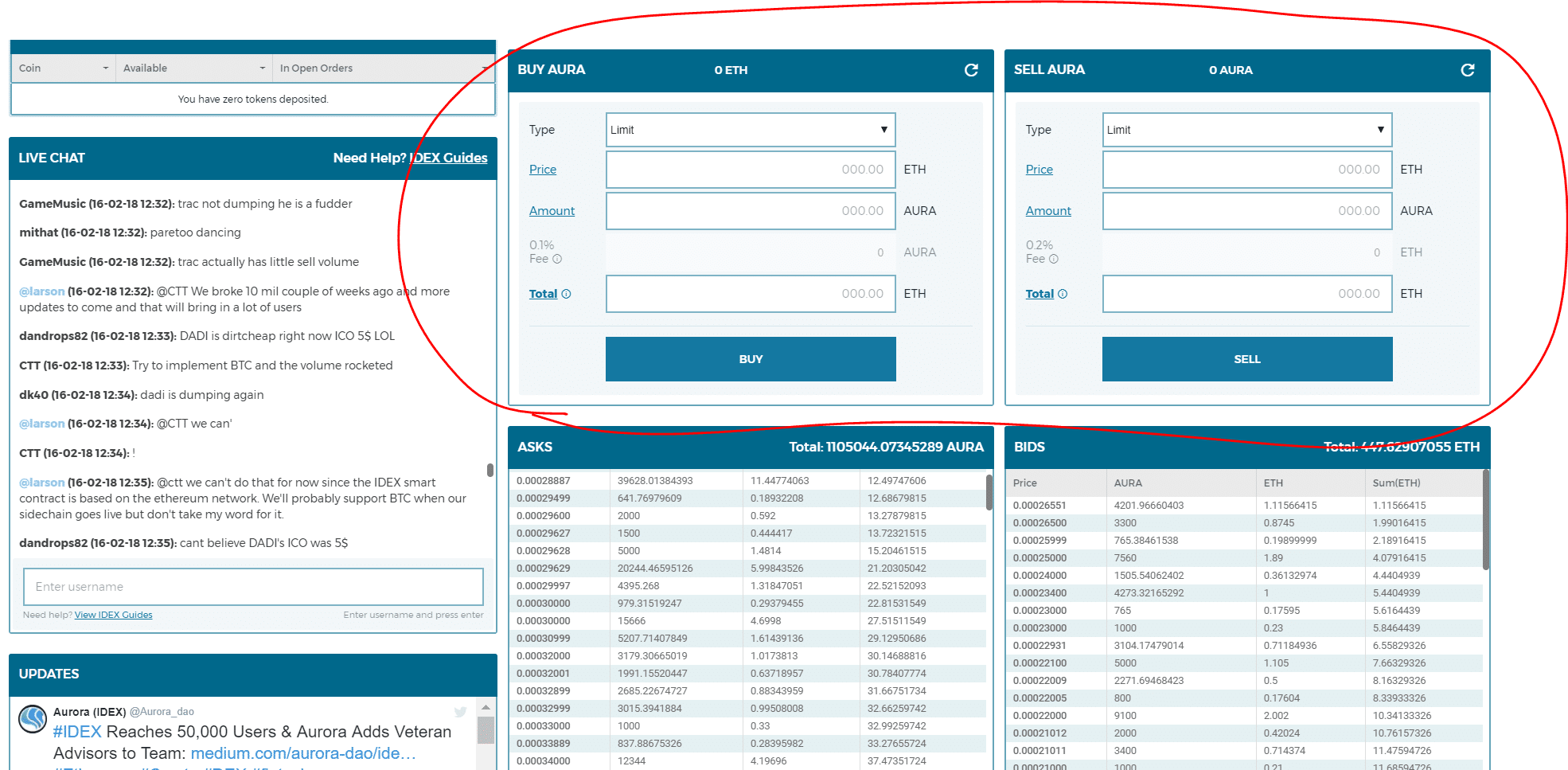Latest news about Bitcoin and all cryptocurrencies. Your daily crypto news habit.
IDEX Exchange Review
IDEX is an Ethereum-based decentralized exchange that features Ethereum and ERC20 token trading pairs. Like EtherDelta, it employs smart contracts that allow users to manage their private keys and trade in a secure, peer-to-peer environment. It also features Ledger Nano S and Meta Mask Wallet integrations, safer alternatives for fund management than manually entering your private key.
Unlike EtherDelta (or other DEXs), though, IDEX leverages its smart contracts to manage transactions for its users. You’ll still sign off on a transaction with your private key, but the exchange itself will broadcast the transaction to the Ethereum blockchain for you. This allows the exchange to update account balances and order books in real time, while also managing the flow of network transactions to reduce friction. This gives IDEX the user experience of a centralized exchange without sacrificing the security and user control of a decentralized exchange.
Key Info
Site Type
Decentralized Cryptocurrency Exchange
Company Location
Republic of Panama
Launch
2017
Deposit/Withdrawal Method
Cryptocurrency
Available Cryptocurrencies
Ethereum and ERC20 Tokens
Community Trust
Good
Security
Great
Fees
Low
Customer Service
Good
Site
Visit IDEX
jQuery(document).ready(function($) {
$("#table-6334").stacktable({ myClass:"stacktable small-only" });
});
How IDEX Works
As with most any Ethereum-powered DEX, smart contracts are the name of the game for IDEX. You’ll manage all of your funds through the exchange’s smart contract, and so long as no one else has your private key, your funds can’t be touched once they’ve been stored in the contract unless you sign off on them.
Once on the exchange, you’ll notice that everything you need to trade is immediately in front of you. Your wallet balances, the trading chart, order book, trading pairs, and other tools are all displayed on a single page. It may seem overwhelming at first to have all of this bunched together, but we’ll be going over each component below–and having everything on one page actually makes exchanging a breeze.
First things first, you’ll need to deposit funds into the exchange’s smart contract to get started. At the top right corner, there’s an account dropbox that allows you to integrate a new wallet or create one through the exchange. If you decide to create one, the exchange will produce a private key for you and a Wallet Keystore File. Whether you’re creating a new wallet or accessing an old one, you have four options for opening a wallet on the exchange:
- Keystore File: You can directly upload your private key using a KeyStore file for an Ethereum address you created on the exchange or otherwise.
- Manually Entered Private Key: You can choose to manually enter your private key to unlock an Ethereum address’ funds.
- MetaMask: You can unlock your MetaMask wallet and access it through the exchange.
- Ledger Nano S: You can integrate your Ledger Nano S into the exchange and deposit funds directly from it.
Hardware wallet integration is one of the greatest added benefits of using a decentralized exchange like IDEX. Using a Ledger to trade on IDEX insulates you from risks like malware and phishing attacks. Meta Mask will protect you from phishing attacks but not malware, and as the EtherDelta DNS hack showed us, manually entering your private keys leaves your funds ripe for phishing and is the most vulnerable option for accessing funds.
Once you’ve got your funds in hand on the exchange, you have to deposit them into the exchange’s smart contract. It seems like a silly extra step, but it’s actually in your favor, as this smart contract keeps your funds safe while you trade and allows the exchange to broadcast transactions directly to the network. You can deposit from your wallet into the exchange through the Quick Balances tab at the top of the page and adjust the gas price for this transaction at your leisure.
Once you’ve got funds on the exchange, you can start trading. IDEX allows you to create market/limit orders, and unlike other DEXs, you can cancel trades without paying gas.
This is where IDEX separates itself from the decentralized milieu. You can cancel trades on IDEX without having to pay extra because all trades are executed by the exchange itself. Thus, when you sign-off on a trade, you agree to make that trade but the exchange’s smart contract is in charge of broadcasting it to the network, so until the transaction is sent to be mined, you can ask the exchange to rescind it.
If you’ve ever tried to fill an order on EtherDelta, you’ve run the risk of having that transaction fail. Sometimes, orders are claimed by more than one party, and since the order book isn’t updated until after a transaction is processed on the network, a stale orderbook can result in users trying to make trades on orders that are already filled. IDEX’s system cures this headache by updating the orderbook in real time after an order is filled. This model offers users the advantage of user-controlled funds with the convenience of a freshly updated order system they’d find on a centralized exchange.
IDEX Account Security
In general, decentralized exchanges feature security buffs that centralized exchanges, by design, cannot support. IDEX is no exception. The exchange itself runs as a node on the Ethereum network, so it comes replete with all of the security a blockchain network entails for its users.
Further, the exchange’s smart contracts keep funds locked-in until the private key signs a transaction to move them. You could keep your funds on the exchange and not break a sweat over it being compromised like we’ve seen too many times with centralized ones. Reason being, there’s no central point of failure for a hacker to tap into funds. All funds are held in smart contracts on the Ethereum blockchain, so there’s no threat of someone hacking into a wallet reserve because IDEX doesn’t hold user funds in one.
The Ledger Nano S integration is another of IDEX’s key benefits and, taken with the exchange’s overall decentralized structure, it makes for one of the most secure trading experiences out there.
The only thing you’d have to worry about in terms of security is if IDEX’s domain name service provider is compromised and a hacker hijacks its URL. We saw this happen to Ether Delta, but if something like this were to happen, your funds will be safe as long as you don’t manually enter your private keys into the fake website.
IDEX Trading Pairs
As we went over earlier, the exchange deals exclusively with Etherum and ERC20 tokens. As such, you won’t have access to anything outside the Ethereum family, but that still leaves you with plenty of options.
Plus, like EtherDelta, IDEX often features tokens hot-off their ICOs before they hit centralized exchanges, allowing you to get in early before something hits an exchange with more volume.
IDEX Fees and Limits
IDEX charges a 0.1% fee for market makers (those who make liquidity by creating a new order for the order book) and 0.2% for takers (those who take liquidity by filling an order already on the book). Takers are also responsible for paying the gas fee for a transaction, a process IDEX goes into more detail on its FAQs page:
“Market takers are responsible for covering the gas fees associated with each trade. Given our design, the exchange must pay this gas fee, priced in ether, when dispatching the trade to the network and then deduct it from the balance of the market taker. When exchanging tokens for ether the amount of eth deducted matches that of the gas fee. When exchanging ether for tokens, IDEX deducts the equivalent amount of tokens based on the price of the asset in ETH. This price is calculated using the average of the last 10 trades.
Ethereum gas prices have been increasing and often this fee is higher than the IDEX exchange fee of 0.2%. These high gas prices have led us to instituting order minimums in an attempt to reduce costs for our users.”
Thus, the taker fee could be more than 0.2% depending on the network’s traffic. This also means that all orders must be at least 0.15 ETH for makers and 0.05 for takers so that the exchange can manage transaction fees efficiently. In addition, there’s a 0.04 ETH minimum withdrawal amount for Ethereum and tokens alike. IDEX does not have trading or withdrawal limits.
IDEX Customer Support
The exchange features a chat box where users and support team alike can answer queries and concerns. The exchange’s FAQs page is quite thorough and comprehensive, as well. Alex and Phil Wearn, IDEX’s founders, are also active on the project’s subreddit and usually respond promptly to customer questions and complaints.
The site also features a contact form for reaching out to the team and a link to IDEX’s Telegram.
IDEX Community Sentiment
IDEX hasn’t been around too long, so its community of supporters is still growing and nowhere near the size of centralized competitors.
That said, the exchange recently reached a milestone of 50,000 users, an impressive mark for a DEX launched 5 months ago. Further, most users who frequent IDEX are positive about the experience, and some say that it’s an all-around better alternative to EtherDelta.
Conclusion
By all measures, IDEX lives up to its growing reputation as EtherDelta’s more attractive little brother (perhaps little only applies to age here, as IDEX actually outranks EtherDelta by trading volume). The bi-layered transaction settlement model circumvents the same pitfalls that plague EtherDelta’s system, and it makes for a generally easier, less frustrating trading experience.
Still, this model has its drawbacks, namely that it makes the exchange not completely trustless. You still control your private keys, but you’re relying on the exchange to execute trades for you, leaving the final step of the process somewhat centralized. Thankfully, the IDEX has introduced the AURA token and their new staking model to solve this issue, so expect the exchange to become even more decentralized as 2018 progresses.
It’s still beholden to the Ethereum blockchain like any Ethereum-powered DEX, and at times of network trouble, users can run into problems. All things considered, however, IDEX’s design mitigates many of the issues that network congestion can cause for a DEX, and its user experience/interface is cleaner than its competition. IDEX is a rising star in the decentralized exchange space, and if you like EtherDelta but find yourself exasperated from using it, it’s definitely worth trying out.
IDEX Rating-
Beginner Friendliness
-
Customer Support
-
Community Sentiment
-
Fees
-
Security
-
Available Cryptocurrencies
.wp-review-6328.review-wrapper { width: 100%; float: left }
.wp-review-6328.review-wrapper, .wp-review-6328 .review-title, .wp-review-6328 .review-desc p, .wp-review-6328 .reviewed-item p { color: ;}
.wp-review-6328 .review-links a { color: ;}
.wp-review-6328 .review-links a:hover { color: ;}
.wp-review-6328 .review-list li, .wp-review-6328.review-wrapper{ background: ;}
.wp-review-6328 .review-title, .wp-review-6328 .review-list li:nth-child(2n){background: ;}
.wp-review-6328.review-wrapper, .wp-review-6328 .review-title, .wp-review-6328 .review-list li, .wp-review-6328 .review-list li:last-child, .wp-review-6328 .user-review-area, .wp-review-6328 .reviewed-item {border-color: ;}
{
"@context": "http://schema.org",
"@type": "Review",
"itemReviewed": {
"@type": "Thing",
"name": "IDEX Rating"
},
"reviewRating": {
"@type": "Rating",
"ratingValue": "4.0",
"bestRating": 5
},
"author": {
"@type": "Person",
"name": "Colin Harper"
},
"reviewBody": ""
}
The post IDEX Exchange Review appeared first on CoinCentral.
Disclaimer
The views and opinions expressed in this article are solely those of the authors and do not reflect the views of Bitcoin Insider. Every investment and trading move involves risk - this is especially true for cryptocurrencies given their volatility. We strongly advise our readers to conduct their own research when making a decision.


